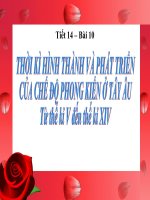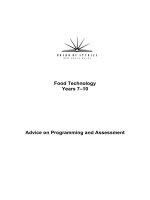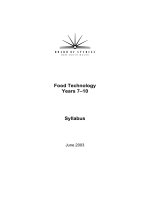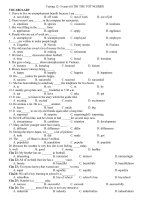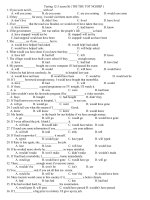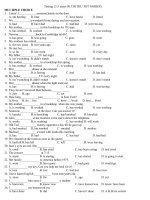Testing 12-3 years (10 )
Bạn đang xem bản rút gọn của tài liệu. Xem và tải ngay bản đầy đủ của tài liệu tại đây (103.21 KB, 4 trang )
Testing 12-3 years (10) (THI THU TOT NGHIEP )
READING COMPREHENSION
READING 1
English is my mother tongue. Besides, I can speak French and Spanish. I studied the two languages
when I was at school. Now, I am still learning Spanish at the University. As for me, mastering a foreign
language is not easy. After studying a language, practice is very necessary and useful. Traveling to the country
where the target language is spoken is very helpful, but if you cannot speak the language well enough you will
certainly have troubles. I also frequently go to the movies, watch television, listen to the radio in the language I
am trying to learn. Reading is another good way to learn. Books are good, but I personally think newspapers
and magazines are better. However, getting some knowledge of the language is the most important thing.
Grammar and vocabulary should be mastered first.
Câu 1: How many languages can the writer speak?
A. 1 B. 2 C. 3 D. 4
Câu 2: The writer has learnt Spanish ________.
A. in Spain B. at high school C. at University D. at school and at University
Câu 3: Traveling may cause troubles if ________.
A. you cannot speak the language well enough. B. you can speak the language well enough.
C. you can speak the language bad enough. D. you can communicate in the target language.
Câu 4: Some useful ways to practice your target language are ________.
A. listening to the radio and watching TV in the target language.
B. reading books in the target language.
C. seeing films in the target language.
D. all are correct.
Câu 5: According to the writer, what should be mastered first?
A. vocabulary B. vocabulary and grammar C. writing skill D. reading skill.
READING 2
People usually sing because they like music or because they feel happy. They express their happiness by
singing. When a bird sings, however, its song usually means much more than that the bird is happy. Birds have
many reasons for singing. They sing to give information. Their songs are their language.
The most beautiful songs are sung by male birds. They sing when they want to attract a female bird. It is their
way of saying that they are looking for a wife.
Birds also sing to tell other birds to keep away. To a bird, his tree or even a branch of a tree is his home. He
does not want strangers to come near him, so he sings to warn them.
If a bird cannot sing well, he usually has some other means of giving important information. Some birds dance,
spread out their tails or make other signs.
1. People sing because ______.
A. they feel happy B. they are good at singing
C. they want to tell a story D. they know many songs
2. What is one of the main reasons why birds sing?
A. They are in a bad temper. B. They want to give information.
C. They are sad. D. They can sing many songs.
3. Which birds sing the most beautiful songs?
A. Male birds B. Young birds which attract male birds
C. Female birds which attract male birds D. Female birds
4. According to the passage, a bird sings ______.
A. to stop sadness B. to tell strangers to keep away
C. to warn about the approach of people D. to tell other birds to come quickly
5. Most birds usually ______ if they cannot sing well.
A. give information in another way B. warn other birds to go away
C. find a wife D. fly in the sky
READING 3
WHY PEOPLE WORK
All of us know that we have to work hard to earn a living ourselves and to support our family. However,
we work not only for material life but also for many things that are beyond gaining money. We are working to
affirm our ability on a certain field. We feel self-reliant, self-confident, and proud because we are financially
independent.
Anyone who works is regarded as a useful member of society. We are working that means we are
contributing useful goods and services to our country.
Working helps us train our skills and talents. We always try our best to do a good job. The better we work, the
more money we earn and that motivate us to work harder. Without working, a man’s life will be empty,
purposeless and meaningless and it is easy for a lazy jobless man to do wrongs.
1. We have to work hard____________
A. because we are forced to B. to make our material life better
C. to make ourselves purposeless D. All are correct
2. Besides money, ________________.
A. we can get many other benefits from work B. we can get some salary from work
C. we sometimes feel very meaningless D. we can not contribute anything to our country
3. The more we work _____ .
A. the duller we feel B. the less we earn
C. the more we contribute to society D. A and B are correct
4. What motivates us to work harder? - ______.
A. good job B. good pay C. good way D. good skills
5. Without working, one's life is _______.
A. better B. more confident C. self-reliant D. meaningless
READING 4
One of my hobbies is collecting stamps. I have been a collector since I was about seventeen years old, and this
year, I have reached my sixtieth birthday.
I began collecting stamps in the summer of 1962. I was sick. I couldn’t go to school. I was really bored,
so my grandfather brought me a stamp album with a lot of stamps. I took to it immediately. I was fascinated by
the beautiful colors.
Now I have got one of the largest collections of French stamps in the country. It was really an interesting
hobby and has given me hours of enjoyment. People think it must be very lonely but it isn’t at all. You can go
to fairs and exhibitions and meet other people who share the same interest. It needn’t be expensive either .
Câu 1.What is the passage mainly about?
A. the advantages of stamp collecting B. stamp collecting as a hobby of an old man
C. the reason the old man began to collect stamp D. one of the largest French stamp collections
Câu 2.The old man started collecting stamps in__________.
A. 1962 B. year 1962 C. the summer of 1962 D. 1962 years
Câu 3.What does it in line 4 refer to?
A.the stamps B. the stamp album C.the school D. the hobby of collecting stamps
Câu 4.Collecting stamp is a hobby which the writer finds__________.
A.enjoyable B.boring C.amusing D.costly
READING 5
Wild animals (and wild plants) and the wild places where they live are seriously threatened almost everywhere.
One species has become extinct in each year of this century. But many hundreds are now in danger. Lack of
attention would lead to the rapid advance of the process of extinction.
Already many kinds of wild animals has been so reduced in number that their role in the ecosystem is forgotten.
Animals like the great apes, the whales, seals etc. thought to be in danger of extinction.
But even more important, perhaps than individual kinds of animals and plants, whole habitats are in danger of
vanishing: marshes are being drained, and the world forests, especially tropical forests are being cut down to
satisfy man’s needs of timber and paper.
What would our world be like if all the wild animals and wild plants vanished? - Would our life still
exist then?
1. What would happen to the human beings if the wild life vanished?
A. Many species would quickly become extinct. B. The human life would be seriously threatened.
C. Species would go on dying out. D. Tropical forests would be cut down.
2. What is more important than individual kinds of animals and plants?
A. the vanishing of whole habitats. B. the extinction of many species.
D. man’s need of timber and paper. C. the rapid advance of the process of extinction.
3. What does the writer caution us against?
A. cutting down the tropical forests. B. hunting wild animals.
C. draining marshes. D. destroying our environment.
4. What would happen if we cut down forests?
Cutting down forests would cause____________
A. the changes of temperature. B. the flood C. both A and B are correct. D. none are correct.
5. “To threaten” in the passage means________
A. to pollute B. to give fear to C. to vanish D. to poison
READING 6
Samuel Langhorne Clemens, known to the world as Mark Twain, was the son of a lawyer in the State of
Missouri. He was born in 1835. When he was five years old, he was sent to school. He did not like school but
had many friends and was their leader. In summer when school was over, the boys spent many hours on the
river. As Mark Twain said later, many events in “The Adventures of Tom Sawyer” really took place
and the
characters were from his real life. Tom Sawyer was the portrait of the writer; Huckleberry Finn was his friend,
Tom Blankenship; Aunt Polly was his mother; Tom’s brother, Sid, was like his brother Henry. The novel was
published in 1876. It is now known to children and grown-ups all over the world.
1. What was Mark Twain’s father’s job?
A. a writer B. a lawyer C. a teacher D. an adventurer
2. Mark Twain started school in ……
A. 1835 B. 1836 C. 1876 D. 1840
3. Mark Twain ……
A. didn’t like school B. work hard at school
C. liked school very much D. did well at school
4. What did he usually do in summer?
A. He enjoyed reading. C. He spent the holidays on the Mississippi River.
B. He prepared for the next school year. D. He worked as a fisherman.
5. The characters in “The Adventures of Tom Sawyer” were ……
A. boring B. from his imagination C. from his real life D. A and C are correct
READING 7
I was born in Newcastle, a city in the North East of England. Newcastle is on the bank of the
River Tyne. It is quite big, with a population of about 200,000 people. There is a cathedral and a
university. There are five bridges over the River Tyne, which link Newcastle to the next town,
Gateshead, where there is one of the biggest shopping centres in the world. A few years ago, the main
industries were shipbuilding and coalmining, but now the chemical and soap industries are important.
I moved to London ten years ago but I often return to Newcastle. I miss the people, who are very
friendly, and I miss the beautiful countryside near the city, where there are so many hills and streams.
Câu 1: Newcastle is .
A. a city near the North East of England B. a small town in England
C. a city in the North East of England D. a city in the North of England
Câu 2: The population of Newcastle is .
A. 200,000 people B. much less than 200,000 people
C. much more than 200,000 people D. about 200,000 people
Câu 3: Gateshead has one of in the world.
A. the largest rivers B. the most important shipbuilding industries
C. the most beautiful countrysides D. the biggest shopping centres
Câu 4: According to the passage, the writer .
A. is still living in Newcastle B. has never returned to Newcastle
C. doesn't live in Newcastle any more D. has come back to live in Newcastle
Câu 5: Which of the following is NOT true about Newcastle?
A. Its people are friendly. B. Its main industry now is shipbuilding.
C. It has a cathedral and a university. D. It is next to Gateshead.
READING 8
A new study shows that women can reduce their chances of developing heart disease by jogging for about three
hours every week. The researchers at Harvard University Medical in Boston have just reported the results of the
study on the New England Journal of Medicine. The study is the first to show the effectiveness of jogging in the
developing of heart disease in women. Only a few earlier studies have examined the effects of jogging on the
heart, but nearly all have been done on men. The new study involves more than 72,000 women between the
ages of forty and sixty-five during a period of eight years. The researchers have found that women who jog at
least three hours a week have a thirty to forty percent lower chance of suffering a heart attack than those who do
not.
1. The new study is about ______
A. men and heart attack C. the effect of jogging to reduce heart attacks on women
B. men and jogging D. medicine in Harvard University
2. Who have done the research?
A. The journalists on the New England Journal of Medicine
B. The researchers at Harvard University Medical in Boston
C. Women between the ages of forty and sixty-five
D. Some joggers
3. How many hours should women jog at least a week to reduce heart attacks?
A. 3 B. 40 C. 65 D. 72
4. Most of the early researches have been done on____________
A. babies B. children C. women D. men
5. How long does the new research take?
A. 3 years B. 8 years C. 10 years D. 12 years

